This site uses cookies as defined in our Cookie Policy, by continuing to use this site you agree to their use.
Continue
This epic voyage takes you on a journey beyond comparison, visiting enigmatic subantarctic islands and the Antarctic Peninsula. Similar to the South Georgia and Antarctic Odyssey, but with additional time in the Falklands~Malvinas to discover the fascinating history of the islands and encounter the spectacular birdlife found there. Feel awed in the presence of South Georgia’s king penguin colonies, some of the largest on earth. Immerse yourself in the serene grandeur of the Antarctic Peninsula as you embrace the true spirit of exploration and adventure.
| Arrive | Depart | ||||||
| 18th18 | DecDec | 202424 | Ushuaia, Argentina, embark on the Greg Mortimer | ||||
| At 55 degrees latitude south, Ushuaia (pronounced oo-swy-ah) is closer to the South Pole than to Argentina's northern border with Bolivia. It is the capital and tourism base for Tierra del Fuego, the island at the southernmost tip of Argentina.Although its stark physical beauty is striking, Tierra del Fuego's historical allure is based more on its mythical past than on rugged reality. The island was inhabited for 6,000 years by Yámana, Haush, Selk'nam, and Alakaluf Indians. But in 1902 Argentina, eager to populate Patagonia to bolster its territorial claims, moved to initiate an Ushuaian penal colony, establishing the permanent settlement of its most southern territories and, by implication, everything in between.When the prison closed in 1947, Ushuaia had a population of about 3,000, made up mainly of former inmates and prison staff. Today the Indians of Darwin's "missing link" theory are long gone—wiped out by diseases brought by settlers and by indifference to their plight—and the 60,000 residents of Ushuaia are hitching their star to tourism.The city rightly (if perhaps too loudly) promotes itself as the southernmost city in the world (Puerto Williams, a few miles south on the Chilean side of the Beagle Channel, is a small town). You can make your way to the tourism office to get your clichéd, but oh-so-necessary, "Southernmost City in the World" passport stamp. Ushuaia feels like a frontier boomtown, at heart still a rugged, weather-beaten fishing village, but exhibiting the frayed edges of a city that quadrupled in size in the '70s and '80s and just keeps growing. Unpaved portions of Ruta 3, the last stretch of the Pan-American Highway, which connects Alaska to Tierra del Fuego, are finally being paved. The summer months (December through March) draw more than 120,000 visitors, and dozens of cruise ships. The city is trying to extend those visits with events like March's Marathon at the End of the World and by increasing the gamut of winter activities buoyed by the excellent snow conditions.A terrific trail winds through the town up to the Martial Glacier, where a ski lift can help cut down a steep kilometer of your journey. The chaotic and contradictory urban landscape includes a handful of luxury hotels amid the concrete of public housing projects. Scores of "sled houses" (wooden shacks) sit precariously on upright piers, ready for speedy displacement to a different site. But there are also many small, picturesque homes with tiny, carefully tended gardens. Many of the newer homes are built in a Swiss-chalet style, reinforcing the idea that this is a town into which tourism has breathed new life. At the same time, the weather-worn pastel colors that dominate the town's landscape remind you that Ushuaia was once just a tiny fishing village, snuggled at the end of the Earth.As you stand on the banks of the Canal Beagle (Beagle Channel) near Ushuaia, the spirit of the farthest corner of the world takes hold. What stands out is the light: at sundown the landscape is cast in a subdued, sensual tone; everything feels closer, softer, and more human in dimension despite the vastness of the setting. The snowcapped mountains reflect the setting sun back onto a stream rolling into the channel, as nearby peaks echo their image—on a windless day—in the still waters.Above the city rise the last mountains of the Andean Cordillera, and just south and west of Ushuaia they finally vanish into the often-stormy sea. Snow whitens the peaks well into summer. Nature is the principal attraction here, with trekking, fishing, horseback riding, wildlife spotting, and sailing among the most rewarding activities, especially in the Parque Nacional Tierra del Fuego (Tierra del Fuego National Park). Having made your way to Ushuaia, you will be met by a representative of AE Expeditions and transferred to our group hotel. This evening, enjoy a light refreshment as you meet your fellow expeditioners at a Welcome Reception. Afterwards, dine at your leisure (dinner not included). | |||||||
| 19th19 | DecDec | 202424 | Ushuaia, Argentina | ||||
| At 55 degrees latitude south, Ushuaia (pronounced oo-swy-ah) is closer to the South Pole than to Argentina's northern border with Bolivia. It is the capital and tourism base for Tierra del Fuego, the island at the southernmost tip of Argentina.Although its stark physical beauty is striking, Tierra del Fuego's historical allure is based more on its mythical past than on rugged reality. The island was inhabited for 6,000 years by Yámana, Haush, Selk'nam, and Alakaluf Indians. But in 1902 Argentina, eager to populate Patagonia to bolster its territorial claims, moved to initiate an Ushuaian penal colony, establishing the permanent settlement of its most southern territories and, by implication, everything in between.When the prison closed in 1947, Ushuaia had a population of about 3,000, made up mainly of former inmates and prison staff. Today the Indians of Darwin's "missing link" theory are long gone—wiped out by diseases brought by settlers and by indifference to their plight—and the 60,000 residents of Ushuaia are hitching their star to tourism.The city rightly (if perhaps too loudly) promotes itself as the southernmost city in the world (Puerto Williams, a few miles south on the Chilean side of the Beagle Channel, is a small town). You can make your way to the tourism office to get your clichéd, but oh-so-necessary, "Southernmost City in the World" passport stamp. Ushuaia feels like a frontier boomtown, at heart still a rugged, weather-beaten fishing village, but exhibiting the frayed edges of a city that quadrupled in size in the '70s and '80s and just keeps growing. Unpaved portions of Ruta 3, the last stretch of the Pan-American Highway, which connects Alaska to Tierra del Fuego, are finally being paved. The summer months (December through March) draw more than 120,000 visitors, and dozens of cruise ships. The city is trying to extend those visits with events like March's Marathon at the End of the World and by increasing the gamut of winter activities buoyed by the excellent snow conditions.A terrific trail winds through the town up to the Martial Glacier, where a ski lift can help cut down a steep kilometer of your journey. The chaotic and contradictory urban landscape includes a handful of luxury hotels amid the concrete of public housing projects. Scores of "sled houses" (wooden shacks) sit precariously on upright piers, ready for speedy displacement to a different site. But there are also many small, picturesque homes with tiny, carefully tended gardens. Many of the newer homes are built in a Swiss-chalet style, reinforcing the idea that this is a town into which tourism has breathed new life. At the same time, the weather-worn pastel colors that dominate the town's landscape remind you that Ushuaia was once just a tiny fishing village, snuggled at the end of the Earth.As you stand on the banks of the Canal Beagle (Beagle Channel) near Ushuaia, the spirit of the farthest corner of the world takes hold. What stands out is the light: at sundown the landscape is cast in a subdued, sensual tone; everything feels closer, softer, and more human in dimension despite the vastness of the setting. The snowcapped mountains reflect the setting sun back onto a stream rolling into the channel, as nearby peaks echo their image—on a windless day—in the still waters.Above the city rise the last mountains of the Andean Cordillera, and just south and west of Ushuaia they finally vanish into the often-stormy sea. Snow whitens the peaks well into summer. Nature is the principal attraction here, with trekking, fishing, horseback riding, wildlife spotting, and sailing among the most rewarding activities, especially in the Parque Nacional Tierra del Fuego (Tierra del Fuego National Park). This morning, please ensure your cabin luggage is fitted with cabin tags clearly labelled with your name and cabin number. Your luggage will be collected from your hotel and transferred directly to the port for clearance and delivered to your cabin ahead of your arrival on board. Please keep any valuables or personal items with you throughout the day. Enjoy free time after check-out, meeting back in the hotel lobby at 2.00 pm to commence a short sightseeing tour of Ushuaia. Ushuaia, capital of Tierra del Fuego is located at the shores of the Beagle Channel and surrounded by the Martial Mountains giving you a unique landscape in Argentina, which is the combination of mountains, sea, glaciers and forests. On this brief introductory tour, you will visit “La Mision” neighbourhood, the old Government House, and the upper area of the city, which offers beautiful panoramic views of Ushuaia and the Beagle Channel. During the excursion you will see the antique houses that belonged to the first families settled in Ushuaia. The excursion ends with a visit to the Old Prison Museum before transferring to the pier for embarkation at approximately 4.00 pm. If you choose to not participate in the sightseeing tour, you will need to make your own way to the Prison Museum carpark by 3.45 pm to re-join the group for the transfer to the pier for embarkation. After embarkation, you will have time to settle into your cabin before our important mandatory briefings. As the ship pulls away from port, we will gather on the deck to commence our adventure with spectacular views over Ushuaia and Tierra del Fuego. | |||||||
| 20th20 | DecDec | 202424 | At Sea | ||||
| 21st21 | DecDec | 202424 | At Sea | ||||
| 22nd22 | DecDec | 202424 | Antarctic Peninsula, Antarctica | ||||
| Remote and otherworldly, Antarctic is irresistible for its spectacular iceberg sculptures and calving glaciers, and for the possibility of up-close encounters with marine mammals and the iconic penguins. The Antarctic Peninsula – the main peninsula closest to South America – has a human history of almost 200 years, with explorers, sealers, whalers, and scientists who have come to work, and eventually intrepid visitors coming to enjoy this pristine and remote wilderness. It is a region of protected bays, unscaled snow-capped mountains, vast glaciers and a few places where whalers or scientists have worked. Just as irresistible are the many Gentoo and Chinstrap Penguin colonies, the seals basking on ice floes, the whales and orcas. It is almost impossible to describe the feeling of arriving in Antarctica. Spotting your first iceberg and taking a deep breath of some of the most fresh, crisp air on earth is an experience that will stay with you forever. Once we arrive, the western side of the Antarctic Peninsula and the South Shetland Islands are ours to explore, and we have a host of choices available to us. Because we are so far south, we will experience approximately 18-24 hours of daylight and the days can be as busy as you wish. Your experienced expedition team, who have made countless journeys to this area, will use their expertise to design your voyage from day to day, choosing the best options based on the prevailing weather, ice conditions and wildlife opportunities. We generally make landings or Zodiac excursions twice a day. You will want to rug up before joining Zodiac cruises along spectacular ice cliffs or among grounded icebergs, keeping watch for whales, seals and porpoising penguins. Zodiacs will also transport you from the ship to land, where you can visit penguin rookeries, discover historic huts and explore some of our favourite spots along the peninsula. While ashore we aim to stretch our legs, wandering along pebbly beaches or perhaps up snow-covered ridgelines to vantage points with mountains towering overhead and ice-speckled oceans below. If you have chosen an optional activity, you will have the option to do participate in the activity whenever conditions allow, and of course keen polar plungers will have the chance to fully immerse themselves in polar waters - conditions permitting! The polar plunge can take place at any time during the voyage, so listen out for the announcement from the expedition team and get ready for the most exhilarating dip of your life! In addition to Zodiac cruises and shore excursions, we may ship cruise some of the narrow, dramatic straits separating offshore islands from the mainland, or linger in scenic bays to watch whales travelling or feeding. This is a great time to enjoy the observation lounge or make your way to the bridge (open at the captain’s discretion) for uninterrupted views of Antarctica in all its splendour. Listen out for the creak and deep rumble of glaciers as they carve into sea. Take a quiet moment to experience the wonder of the pristine paradise of the splendid white continent. If you have chosen an optional activity, you will have the option to do enjoy that activity whenever conditions allow. | |||||||
| 23rd23 | DecDec | 202424 | Antarctic Peninsula, Antarctica | ||||
| Remote and otherworldly, Antarctic is irresistible for its spectacular iceberg sculptures and calving glaciers, and for the possibility of up-close encounters with marine mammals and the iconic penguins. The Antarctic Peninsula – the main peninsula closest to South America – has a human history of almost 200 years, with explorers, sealers, whalers, and scientists who have come to work, and eventually intrepid visitors coming to enjoy this pristine and remote wilderness. It is a region of protected bays, unscaled snow-capped mountains, vast glaciers and a few places where whalers or scientists have worked. Just as irresistible are the many Gentoo and Chinstrap Penguin colonies, the seals basking on ice floes, the whales and orcas. | |||||||
| 24th24 | DecDec | 202424 | Antarctic Peninsula, Antarctica | ||||
| Remote and otherworldly, Antarctic is irresistible for its spectacular iceberg sculptures and calving glaciers, and for the possibility of up-close encounters with marine mammals and the iconic penguins. The Antarctic Peninsula – the main peninsula closest to South America – has a human history of almost 200 years, with explorers, sealers, whalers, and scientists who have come to work, and eventually intrepid visitors coming to enjoy this pristine and remote wilderness. It is a region of protected bays, unscaled snow-capped mountains, vast glaciers and a few places where whalers or scientists have worked. Just as irresistible are the many Gentoo and Chinstrap Penguin colonies, the seals basking on ice floes, the whales and orcas. | |||||||
| 25th25 | DecDec | 202424 | Antarctic Peninsula, Antarctica | ||||
| Remote and otherworldly, Antarctic is irresistible for its spectacular iceberg sculptures and calving glaciers, and for the possibility of up-close encounters with marine mammals and the iconic penguins. The Antarctic Peninsula – the main peninsula closest to South America – has a human history of almost 200 years, with explorers, sealers, whalers, and scientists who have come to work, and eventually intrepid visitors coming to enjoy this pristine and remote wilderness. It is a region of protected bays, unscaled snow-capped mountains, vast glaciers and a few places where whalers or scientists have worked. Just as irresistible are the many Gentoo and Chinstrap Penguin colonies, the seals basking on ice floes, the whales and orcas. | |||||||
| 26th26 | DecDec | 202424 | Antarctic Peninsula, Antarctica | ||||
| Remote and otherworldly, Antarctic is irresistible for its spectacular iceberg sculptures and calving glaciers, and for the possibility of up-close encounters with marine mammals and the iconic penguins. The Antarctic Peninsula – the main peninsula closest to South America – has a human history of almost 200 years, with explorers, sealers, whalers, and scientists who have come to work, and eventually intrepid visitors coming to enjoy this pristine and remote wilderness. It is a region of protected bays, unscaled snow-capped mountains, vast glaciers and a few places where whalers or scientists have worked. Just as irresistible are the many Gentoo and Chinstrap Penguin colonies, the seals basking on ice floes, the whales and orcas. | |||||||
| 27th27 | DecDec | 202424 | At Sea | ||||
| 28th28 | DecDec | 202424 | At Sea | ||||
| 29th29 | DecDec | 202424 | South Georgia Island, South Georgia and the South Sandwich Islands | ||||
| South Georgia is a breathtaking destination of towering snow-covered mountains, mighty glaciers, and low-lying grasslands that attract an astounding concentration of wildlife. It is possible to find Southern fur seals, Southern elephant seals and a variety of albatross species including Black-browed, Light-mantled Sooty, Grey-headed and the spectacular Wandering Albatross, plus thousands of King and Macaroni Penguins. South Georgia is also linked to the early Antarctic explorers. Captain James Cook first stepped ashore in 1775, but perhaps more famous is Ernest Shackleton’s arrival in 1916 following the sinking of his ship Endurance. Shackleton’s grave and the whaling museum at Grytviken are highlights, as would be a visit to one of the King Penguin colonies at Salisbury Plain or Gold Harbour. As you near the rugged island of South Georgia, spare a thought for Captain James Cook, who arrived here in 1775 and believed it to be the northern tip of a great southern continent! In fact, it is a small island only 176 km (110 mi) long, but with a 3,000 m (9,842 ft) snow-capped mountain range, some of the world’s largest congregations of wildlife and a truly fascinating human history, South Georgia is an island of incredible riches. On approach, jagged mountain peaks rise steeply, while seabirds are often spotted soaring around the ship. Remember to layer up before joining Zodiac cruises around craggy coves and along the rocky coastline in search of nesting penguins, seal haul-outs and bird cliffs. Remember to keep an eye out for South Georgia’s kelp forests as well - these remarkable underwater ecosystems are quite mesmerising as their fronds sway back and forth on the water’s surface. Zodiacs will also shuttle you from ship to shore, where you can visit some of the largest king penguin colonies on the planet, take a guided walk among fur seals and elephant seals (making sure you listen to your guides and keep your distance!) and wander along pebbled streams and grassy glacial outwash plains. We also hope to visit the remnants of South Georgia’s thriving whaling stations and pay our respects to Sir Ernest Shackleton, whose incredible voyage of survival is synonymous with this island. | |||||||
| 30th30 | DecDec | 202424 | South Georgia Island, South Georgia and the South Sandwich Islands | ||||
| South Georgia is a breathtaking destination of towering snow-covered mountains, mighty glaciers, and low-lying grasslands that attract an astounding concentration of wildlife. It is possible to find Southern fur seals, Southern elephant seals and a variety of albatross species including Black-browed, Light-mantled Sooty, Grey-headed and the spectacular Wandering Albatross, plus thousands of King and Macaroni Penguins. South Georgia is also linked to the early Antarctic explorers. Captain James Cook first stepped ashore in 1775, but perhaps more famous is Ernest Shackleton’s arrival in 1916 following the sinking of his ship Endurance. Shackleton’s grave and the whaling museum at Grytviken are highlights, as would be a visit to one of the King Penguin colonies at Salisbury Plain or Gold Harbour. | |||||||
| 31st31 | DecDec | 202424 | South Georgia Island, South Georgia and the South Sandwich Islands | ||||
| South Georgia is a breathtaking destination of towering snow-covered mountains, mighty glaciers, and low-lying grasslands that attract an astounding concentration of wildlife. It is possible to find Southern fur seals, Southern elephant seals and a variety of albatross species including Black-browed, Light-mantled Sooty, Grey-headed and the spectacular Wandering Albatross, plus thousands of King and Macaroni Penguins. South Georgia is also linked to the early Antarctic explorers. Captain James Cook first stepped ashore in 1775, but perhaps more famous is Ernest Shackleton’s arrival in 1916 following the sinking of his ship Endurance. Shackleton’s grave and the whaling museum at Grytviken are highlights, as would be a visit to one of the King Penguin colonies at Salisbury Plain or Gold Harbour. | |||||||
| 1st01 | JanJan | 202525 | South Georgia Island, South Georgia and the South Sandwich Islands | ||||
| South Georgia is a breathtaking destination of towering snow-covered mountains, mighty glaciers, and low-lying grasslands that attract an astounding concentration of wildlife. It is possible to find Southern fur seals, Southern elephant seals and a variety of albatross species including Black-browed, Light-mantled Sooty, Grey-headed and the spectacular Wandering Albatross, plus thousands of King and Macaroni Penguins. South Georgia is also linked to the early Antarctic explorers. Captain James Cook first stepped ashore in 1775, but perhaps more famous is Ernest Shackleton’s arrival in 1916 following the sinking of his ship Endurance. Shackleton’s grave and the whaling museum at Grytviken are highlights, as would be a visit to one of the King Penguin colonies at Salisbury Plain or Gold Harbour. | |||||||
| 2nd02 | JanJan | 202525 | At Sea | ||||
| 3rd03 | JanJan | 202525 | At Sea | ||||
| 4th04 | JanJan | 202525 | Falkland Islands, Falkland Islands (Malvinas) | ||||
| The Falklands~Malvinas comprises two large islands (East and West Falkland), with over 700 islands scattered off the coast. All but seven of these are uninhabited, with windswept coastlines, white sand beaches and crystal-clear water. These beautifully barren islands are true wildlife havens, sheltering an impressive diversity of birdlife, including the largest black-browed albatross colony on earth. The cold, nutrient-rich waters surrounding the islands make this a prime location for spotting marine life. There are many beautiful areas to explore across the Falklands~Malvinas, each offering a unique perspective on this magnificent archipelago. Your experienced expedition team, who have made countless journeys to this area, will use their expertise to design your voyage from day to day, choosing the best options based on the prevailing winds, weather and wildlife opportunities. Even though we are north of the Antarctic Convergence it can be quite chilly here, so always remember to layer up before joining Zodiac cruises into rocky coves or along sea cliffs, keeping watch for seals, sea lions, dolphins and porpoising penguins. If conditions allow, we also aim to land in historic Stanley, the capital of the Falklands~Malvinas. This charming town has a distinctly British character, with terraced town houses, pioneer cottages and even an iconic red telephone box! Colourful buildings house cosy cafes, English pubs, souvenir shops, a post office and the fascinating Historic Dockyard Museum, with displays on the maritime history of the Falkland Islands, natural history and links to Antarctica. | |||||||
| 5th05 | JanJan | 202525 | Falkland Islands, Falkland Islands (Malvinas) | ||||
| Even though we are north of the Antarctic Convergence it can be quite chilly here, so always remember to layer up before joining Zodiac cruises into rocky coves or along sea cliffs, keeping watch for seals, sea lions, dolphins and porpoising penguins. If conditions allow, we also aim to land in historic Stanley, the capital of the Falklands~Malvinas. This charming town has a distinctly British character, with terraced town houses, pioneer cottages and even an iconic red telephone box! Colourful buildings house cosy cafes, English pubs, souvenir shops, a post office and the fascinating Historic Dockyard Museum, with displays on the maritime history of the Falkland Islands, natural history and links to Antarctica. | |||||||
| 6th06 | JanJan | 202525 | At Sea | ||||
| 7th07 | JanJan | 202525 | Ushuaia, Argentina, disembark the Greg Mortimer | ||||
| At 55 degrees latitude south, Ushuaia (pronounced oo-swy-ah) is closer to the South Pole than to Argentina's northern border with Bolivia. It is the capital and tourism base for Tierra del Fuego, the island at the southernmost tip of Argentina.Although its stark physical beauty is striking, Tierra del Fuego's historical allure is based more on its mythical past than on rugged reality. The island was inhabited for 6,000 years by Yámana, Haush, Selk'nam, and Alakaluf Indians. But in 1902 Argentina, eager to populate Patagonia to bolster its territorial claims, moved to initiate an Ushuaian penal colony, establishing the permanent settlement of its most southern territories and, by implication, everything in between.When the prison closed in 1947, Ushuaia had a population of about 3,000, made up mainly of former inmates and prison staff. Today the Indians of Darwin's "missing link" theory are long gone—wiped out by diseases brought by settlers and by indifference to their plight—and the 60,000 residents of Ushuaia are hitching their star to tourism.The city rightly (if perhaps too loudly) promotes itself as the southernmost city in the world (Puerto Williams, a few miles south on the Chilean side of the Beagle Channel, is a small town). You can make your way to the tourism office to get your clichéd, but oh-so-necessary, "Southernmost City in the World" passport stamp. Ushuaia feels like a frontier boomtown, at heart still a rugged, weather-beaten fishing village, but exhibiting the frayed edges of a city that quadrupled in size in the '70s and '80s and just keeps growing. Unpaved portions of Ruta 3, the last stretch of the Pan-American Highway, which connects Alaska to Tierra del Fuego, are finally being paved. The summer months (December through March) draw more than 120,000 visitors, and dozens of cruise ships. The city is trying to extend those visits with events like March's Marathon at the End of the World and by increasing the gamut of winter activities buoyed by the excellent snow conditions.A terrific trail winds through the town up to the Martial Glacier, where a ski lift can help cut down a steep kilometer of your journey. The chaotic and contradictory urban landscape includes a handful of luxury hotels amid the concrete of public housing projects. Scores of "sled houses" (wooden shacks) sit precariously on upright piers, ready for speedy displacement to a different site. But there are also many small, picturesque homes with tiny, carefully tended gardens. Many of the newer homes are built in a Swiss-chalet style, reinforcing the idea that this is a town into which tourism has breathed new life. At the same time, the weather-worn pastel colors that dominate the town's landscape remind you that Ushuaia was once just a tiny fishing village, snuggled at the end of the Earth.As you stand on the banks of the Canal Beagle (Beagle Channel) near Ushuaia, the spirit of the farthest corner of the world takes hold. What stands out is the light: at sundown the landscape is cast in a subdued, sensual tone; everything feels closer, softer, and more human in dimension despite the vastness of the setting. The snowcapped mountains reflect the setting sun back onto a stream rolling into the channel, as nearby peaks echo their image—on a windless day—in the still waters.Above the city rise the last mountains of the Andean Cordillera, and just south and west of Ushuaia they finally vanish into the often-stormy sea. Snow whitens the peaks well into summer. Nature is the principal attraction here, with trekking, fishing, horseback riding, wildlife spotting, and sailing among the most rewarding activities, especially in the Parque Nacional Tierra del Fuego (Tierra del Fuego National Park). During the early morning, we cruise up the Beagle Channel, before quietly slipping into dock in Ushuaia, where we will be free to disembark around 8.00 am. Farewell your expedition team and fellow passengers as we all continue our onward journeys, hopefully with a newfound sense of the immense power of nature. A transfer to Ushuaia airport or to your hotel is included in the voyage fare. NOTE: At the conclusion of the voyage, we do not recommend booking flights departing Ushuaia prior to 12.00 pm on the day of disembarkation in case of delays. | |||||||
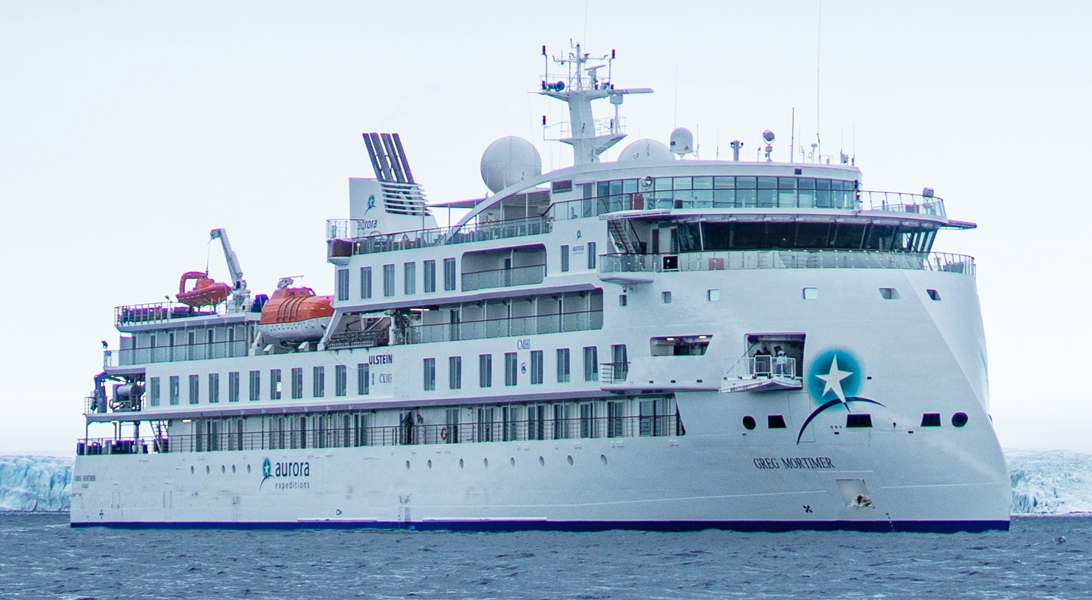






The images shown are for illustration purposes only and may not be an exact representation of what you find on the ship.
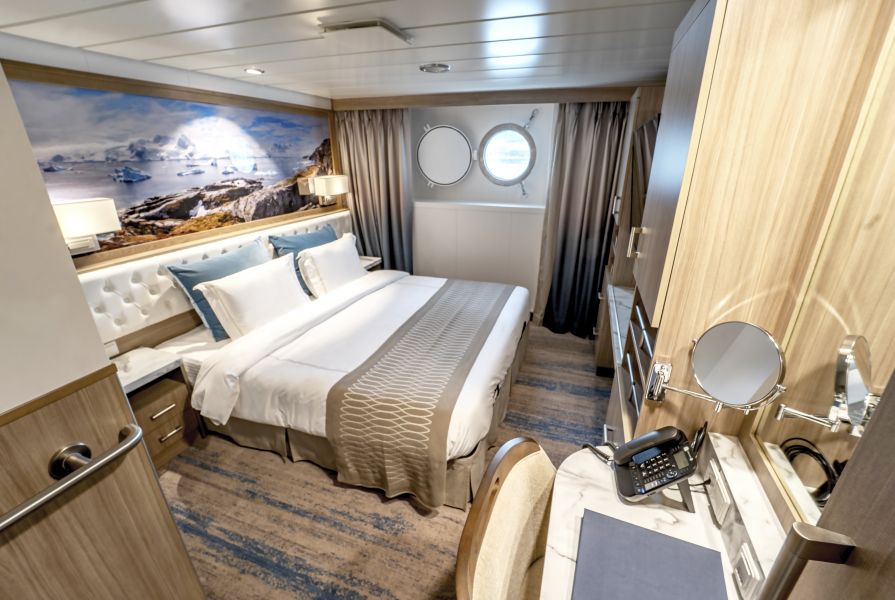
Greg Mortimer features 15 porthole rooms, all with private en-suites. Located on Deck 3, they're close to the mudroom and loading platforms, perfect for adventurers who are looking for a comfortable base that's close to the action.
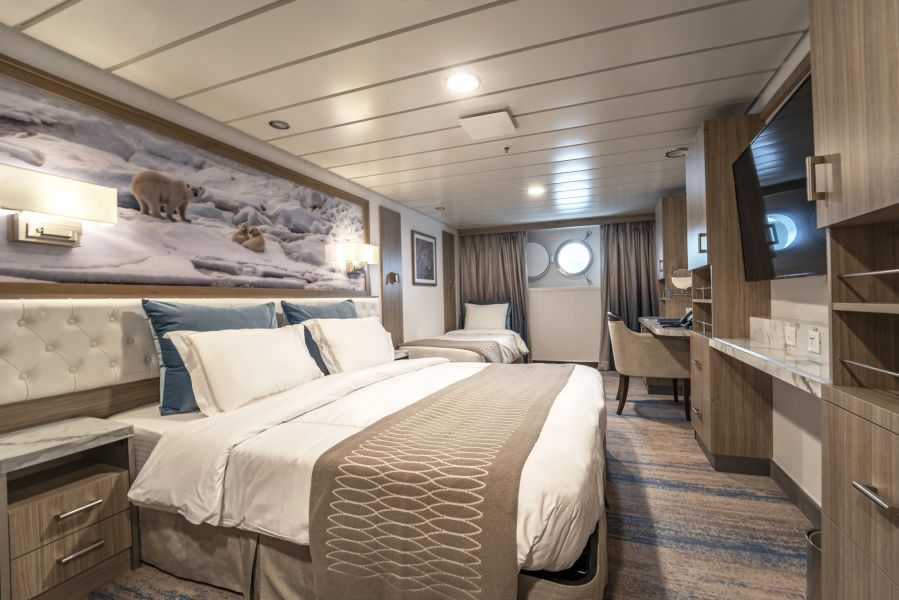
There are six Aurora Stateroom Triple cabins featuring portholes, all with private en-suites. Located on Deck 3, they're close to the mudroom and loading platforms. *Please note the Aurora Stateroom Triple cabins are only available on certain departures
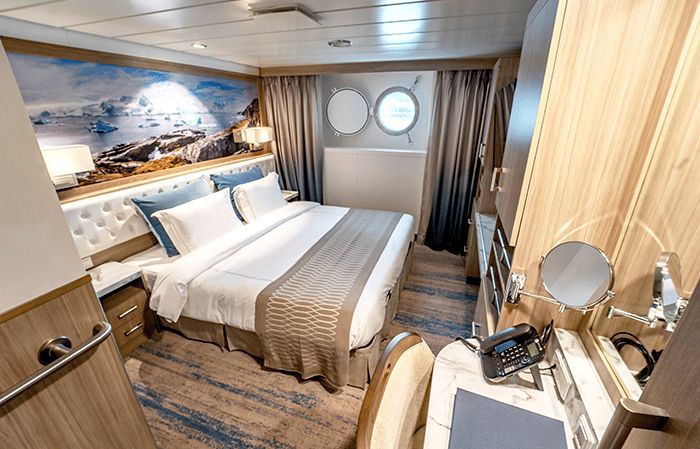
| Grade Code | From | To | |
| AS2G | Aurora Stateroom Twin | £19,244 | £19,244 |
The Greg Mortimer features eight Aurora Stateroom Twin cabins featuring portholes, all with private en-suites. Located on Deck 3, they're close to the mudroom and loading platforms, perfect for adventurers who are looking for a comfortable base that's close to the action.
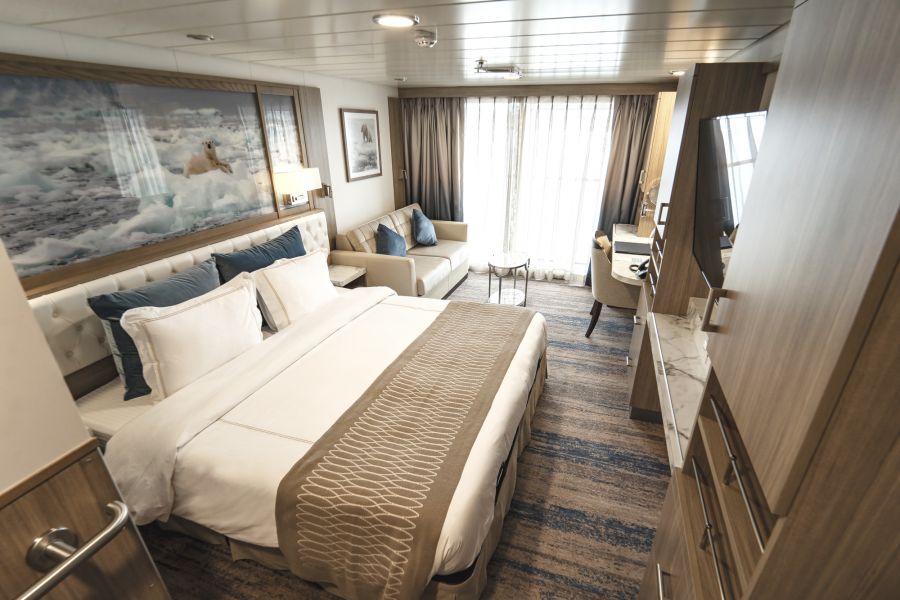
| Grade Code | From | To | |
| BSCG | Balcony Stateroom C (Forward / Aft) | £20,946 | £20,946 |
| BSBG | Balcony Stateroom B (Off Midship) | £21,994 | £21,994 |
| BSAG | Balcony Stateroom A (Midship) | £23,696 | £23,696 |
With 58 rooms available, the Greg Mortimer's Balcony Staterooms are the most abundant cabin category on board. All include en-suite bathrooms, floor to ceiling windows and balconies and a select number are also connecting rooms, perfect for families or groups.
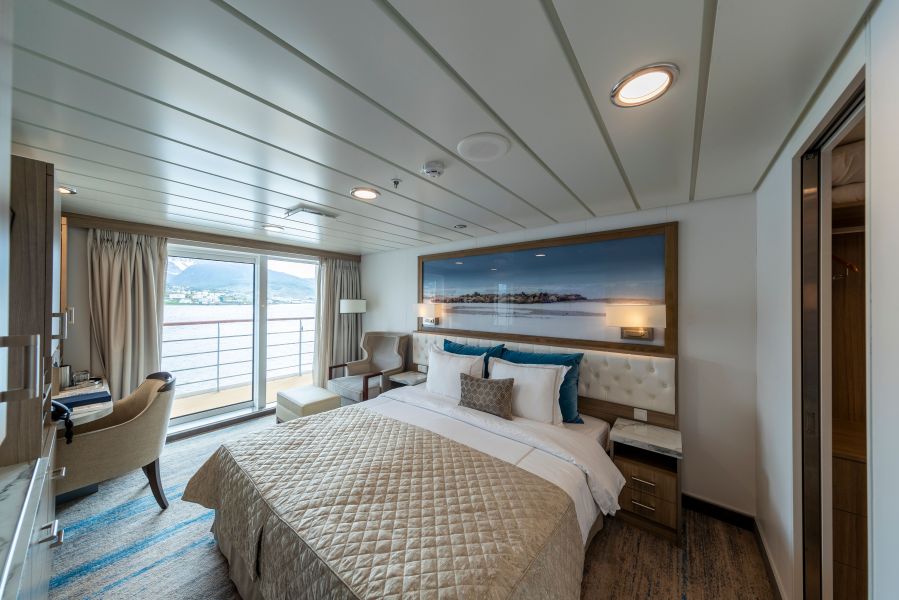
| Grade Code | From | To | |
| CSG | Captain's Suite | £38,492 | £38,492 |
The largest of all our rooms, the Greg Mortimer's singular Captain's Suite will take you to the polar regions in ultimate style and comfort. Complete with large lounge area, balcony, walk-in wardrobe and en-suite, you'll need to get in early to secure this suite.
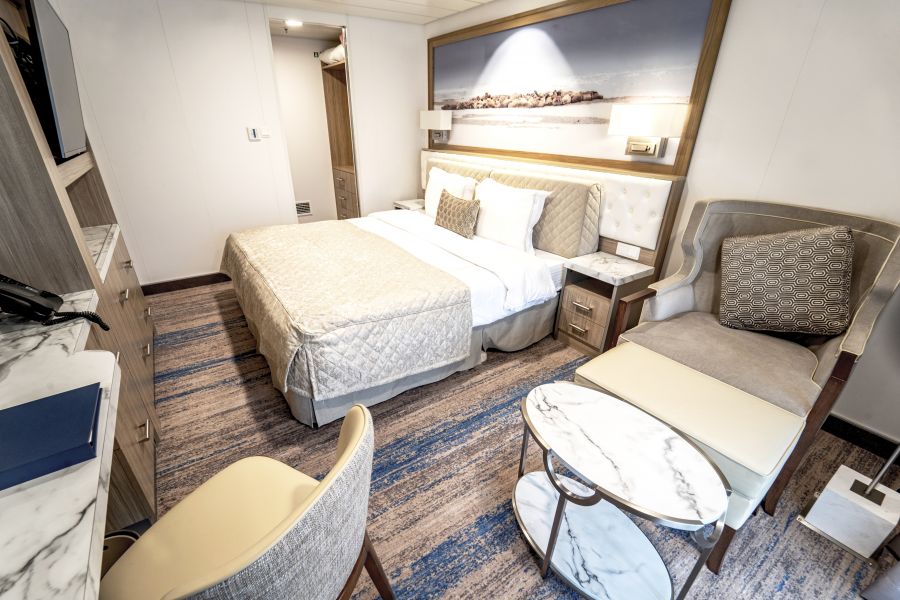
| Grade Code | From | To | |
| JSG | Junior Suite | £32,469 | £32,469 |
The Greg Mortimer's four Junior Suites take in some impressive∘ scenery from their vantage points on Deck 7. When you aren't enjoying a landing, you can relax in the suites' separate lounge area, or just watch the world float by from the private balcony.
The images shown are for illustration purposes only and may not be an exact representation of what you find on the ship.

Meals are served in a large restaurant with family style dining, perfect to swap stories with your new expedition family. Additionally, a private dining area will also be available on request. Enjoy the range of house wine, beers and soft drinks included with dinner after a long day in the wild, preparing yourself for another exciting day to follow.
On the last day of your trip, the team on the Greg Mortimer put on a special farewell four-course dinner and cocktails – a perfect way to reflect on your time on the ship and consolidate lifelong friendships with the people you've met on-board.
The images shown are for illustration purposes only and may not be an exact representation of what you find on the ship.
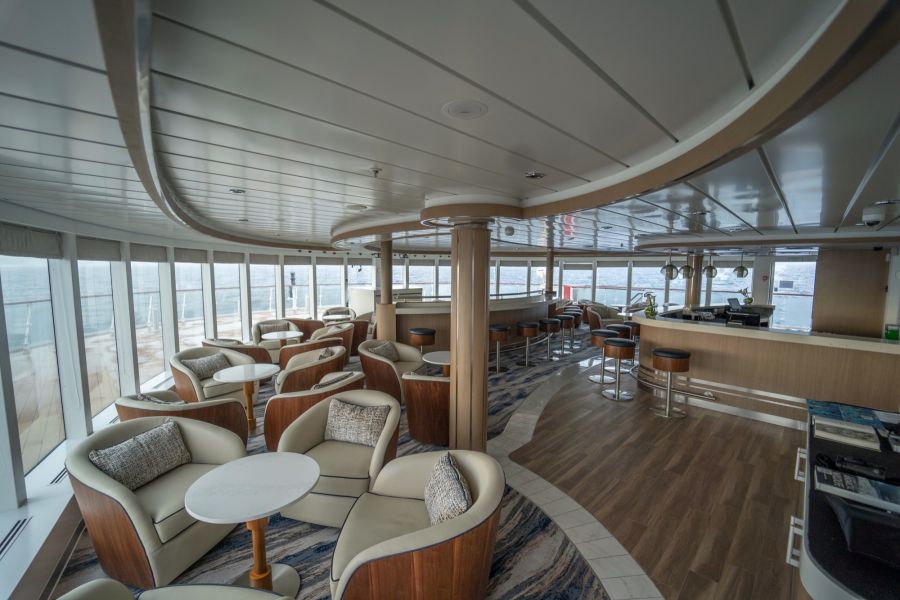
Let's face it – you don't want windowless rooms when travelling around some of the most beautiful locations around the world. This is why the Greg Mortimer is designed with plenty of dedicated observation spaces – ideal for keen bird spotters, wildlife watchers and those wanting to watch the scenery go past.
From the indoor 180-degree lounge and outdoor 360-degree open deck, both on deck 8, to the 270-degree open sundeck on level 7, there are plenty of observation points to share around the ship! If these are full, then you can take up a spot on one of the two hydraulic viewing platforms on deck 5.
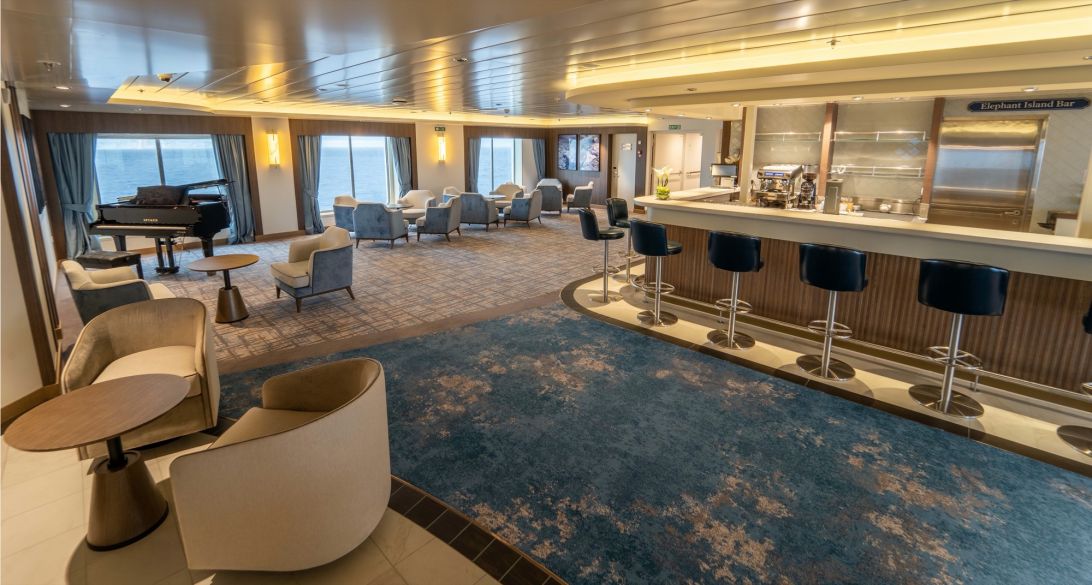
Communal meeting areas have always played a major role in fostering the warm camaraderie on board our ships. They are the heart of the expedition, where people meet to share tales from the day, swap photos, keep an eye out for wildlife and watch the sun go down.
The bars and lounges on board are refined yet inviting places to gather, with floor-to-ceiling windows offering stunning views, and of course friendly bartenders to shoot the breeze with.
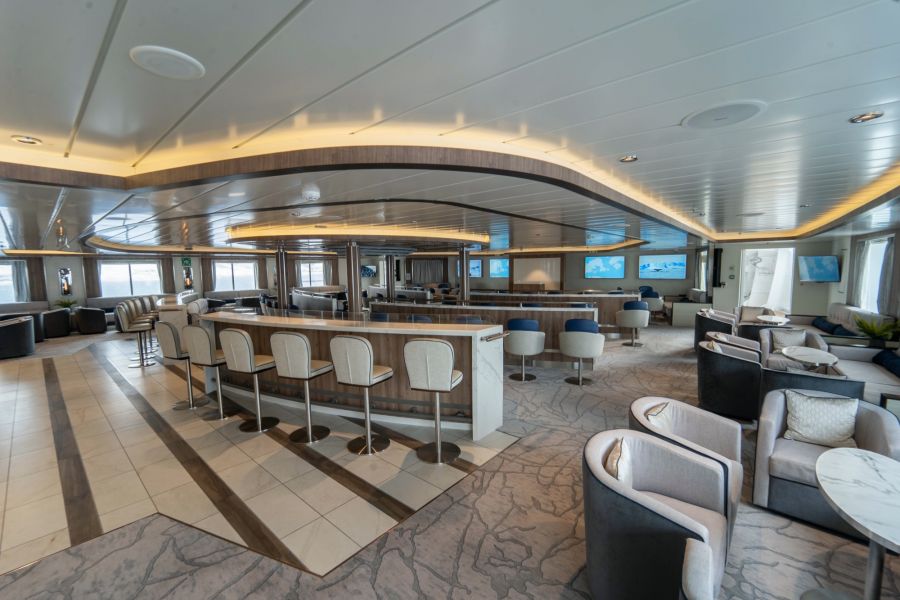
On all our expeditions, there are experts who lead presentations in the spacious lecture room so you can understand the region a little better. These often include topics as broad as history and culture to biology and climate change, these presentations aim to educate and entertain.
The images shown are for illustration purposes only and may not be an exact representation of what you find on the ship.
The images shown are for illustration purposes only and may not be an exact representation of what you find on the ship.
| 20 nights aboard the Greg Mortimer | |||
| Fully-serviced accommodation in your chosen stateroom | |||
| An informative and entertaining lecture program by our team of experts | |||
| Complimentary 3-in-1 polar jacket and the use of gumboots | |||
| Entry fees to historic or tourist sites | |||
| Daily shore excursions, guided walks, Zodiac cruises and some activities | |||
| Daily breakfast, lunch and dinner including house wines, beers and soft drinks and afternoon tea and snacks | |||
| Complimentary use of fitness centre | |||
| Comprehensive pre-departure information kit and destination resource guide | |||
| Captain’s Welcome and Farewell Cocktail Reception including four-course dinner, house cocktails, house beer and wine, non-alcoholic beverages | |||
| Complimentary access to onboard medical doctor or clinic, if required | |||
| An experienced team of destination specialists and activity leaders | |||
| Pre-dinner cocktail hour including cold canapes and bar snacks | |||
| Photographic voyage log (post-voyage) | |||
| Port Taxes and Fees | |||
 | ABTA and ATOL Protection* | ||
Date 18th Dec 2024 |
Nts 20 |
Oceanview  |
Balcony £21,994pp |
Suite £32,469pp |
Date 18th Dec 2024 |
Nts 20 |
Oceanview  |
Balcony £21,994pp |
Suite £32,469pp |

| Oceanview staterooms |  | ||
| AS2G | Aurora Stateroom Twin |  | |
| Balcony staterooms from | £21,994pp | ||
| BSCG | Balcony Stateroom C (Forward / Aft) |  | |
| BSBG | Balcony Stateroom B (Off Midship) | £21,994pp | |
| BSAG | Balcony Stateroom A (Midship) | £23,696pp | |
| SBSG | Superior Balcony Stateroom | £25,856pp | |
| Suite staterooms from | £32,469pp | ||
| JSG | Junior Suite | £32,469pp | |
| CSG | Captain's Suite | £38,492pp | |
Fusion Cruises when selling travel arrangements is a trading name of The Midcounties Co-operative Ltd. Fusion Cruises is an Accredited Body Member of Midcounties Co-operative Travel Consortium. (ABTA:P6652, ATOL:6053).
Book with Confidence. We are a Member of ABTA which means you have the benefit of ABTA’s assistance and Code of Conduct.
Some of the flights and flight-inclusive holidays on this website are financially protected by the ATOL scheme but ATOL protection does not apply to all holiday and travel services offered on this website. This website will provide you with information on the protection that applies in the case of each holiday and travel service offered before you make your booking. If you do not receive an ATOL Certificate then the booking will not be ATOL protected. If you do receive an ATOL Certificate but all parts of your trip are not listed on it, those parts will not be ATOL protected. Please see our booking conditions for information, or for more information about financial protection and the ATOL Certificate go to: www.caa.co.uk
